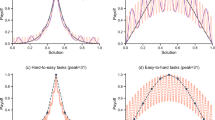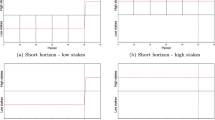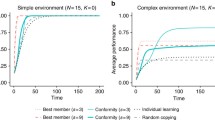Abstract.
The artificial context “Target the Two” has been used in experiments to explore some of the features of routinization and learning. Two agents must learn to coordinate their actions to achieve a common goal, without being allowed to use verbal communication. This article reports an experiment, in which we compare the degree of routinization and the performance of players in two treatments. Each treatment submits players to the same sequence of starting configurations, but differs in terms of the payoff function. In the first treatment (A), the payoff is based on the number of moves required to achieve the goal, whereas in the second treatment (B) the payoff depends on the time required for completion. We observe that (1) in treatment B subjects tend to play in a more “routinized” way and (2) treatment B reduces the time spent on play, but does not decrease the resources (the number of moves) used, relative to treatment A.
Similar content being viewed by others
Author information
Authors and Affiliations
Rights and permissions
About this article
Cite this article
Garapin, A., Hollard, M. Routines and incentives in group tasks* . J Evol Econ 9, 465–486 (1999). https://doi.org/10.1007/s001910050092
Issue Date:
DOI: https://doi.org/10.1007/s001910050092




